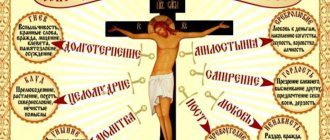Telegram channel @ieshua.org
When Jesus taught Christians to pray the Lord's Prayer, He said that the prayer should include the following words: “And forgive us our debts” (Matthew 6:12; or “sins” - Luke 11:4).
This suggests that we will never achieve perfection in this life, but will always have debts that require God's forgiveness. This is not surprising (cf. 1 John 1:8). But it also raises a practical question: If I am a Christian, justified by faith, has not God already forgiven me all my past, present and future sins? And if so, why do I need to keep asking for it? Doesn't this mean that I doubt God's promise?
Clearly, Jesus would not teach us to pray in a way that would cause us to doubt our Heavenly Father. However, how does the truth of justification “It is finished!” relate? with the constant need to ask for forgiveness?
Justification and final forgiveness
Are all your sins - past, present and future - forgiven if you are a Christian? In some sense the answer must be yes. Pay special attention to the highlighted words:
“And you, who were dead in sins and in the uncircumcision of your flesh, He made alive together with Him, forgiving us all our sins , having destroyed the handwriting that was against us, which was against us, and He took it out of the way and nailed it to the cross.” (Col. 2:13–14)
According to Paul, all our crimes were forgiven when we came alive with Christ. All our debts were nailed to the cross. When Jesus bore our sins in His body on the tree, He did not deprive any unborn people of this.
This is the magnificent truth of justification. When we are united with Christ in His death and resurrection, we not only experience God's final judgment of “righteous!”; we also enter into a permanent state of peace with God, which guarantees our final salvation (Rom. 5:1, 9–10; 8:30). This does not mean that everything we do in our justified state is acceptable to God (we still sin); but now He can accept us, since He no longer imputes our sins to us (Rom. 4:7-8; cf. Ps. 102:10).
This is a fundamental part of the gospel, as seen in Romans 1-8.
"Faith is red"
In 1870, F. M. Dostoevsky wrote to A. N. Maikov: “The main question... with which I have been tormented, consciously or unconsciously, all my life is the existence of God.” The answer to the most complex dilemma will take shape over time in the writer’s Creed: “This symbol is very simple, here it is: to believe that there is nothing more beautiful, deeper, more sympathetic, more reasonable, more courageous and more perfect than Christ, and not only is it not, but I tell myself with jealous love , which cannot be. Moreover, if someone proved to me that Christ is outside the truth, and it really were that the truth is outside Christ, then I would rather remain with Christ than with the truth.” Dostoevsky takes his heroes through the circles of hell of doubt, rebellion, rebellion against the laws of existence and God. The characters reflect the writer’s search and confession, his path to the Truth: “Not like a fool, a fanatic, I believe in God”; “My hosanna passed through a great crucible of doubts...” It was under the influence of the biblical word that Dostoevsky’s worldview about the utopia of an “earthly paradise” without a Creator was formed. In The Brothers Karamazov we read: “What a book this Holy Scripture is, what a miracle and what power it gives to man! It’s like a statue of the world and man and human characters, and everything is named and indicated for all eternity.” Hence the author’s reasoning that there is only one test for the fidelity of human beliefs - Christ, and faith is the color red.
The Gospel of Dostoevsky. NIOR RSL. F. 93, room 53, unit. hr. 1.
Sanctification and ongoing forgiveness
However, the New Testament writers do not seem to believe that once-and-for-all forgiveness (justification) is inconsistent with the need for ongoing forgiveness (sanctification). This can be seen not only in the Lord's Prayer, but also in 1 John 1:9: “If we confess our sins, He is faithful and just to forgive us our sins and to cleanse us from all unrighteousness.”
In context, John is not talking about one-time confession that results in one-time forgiveness. He speaks of forgiveness that is both conditional (“if we confess our sins”) and ongoing (“the blood of Jesus His Son cleanses us from all sins”). As we walk in the light, we see our sins more clearly; as we see them more clearly, we confess them; and when we confess them, God is faithful to forgive again and again.
So, in this sense, if you ask, “Are my future sins forgiven?” the answer depends on what you mean. If you mean, “My future sins have already been forgiven, so I will never have to confess them?” - the answer is negative. But if you mean, “Have my future sins already been fully atoned for?” then the answer is a glorious “yes.” The blood that cleanses all our sins - past, present and future - has already been shed once and for all. When we sin as Christians, we don't resort to some plan B; we return to plan A: “And if anyone sins, we have an advocate with the Father, Jesus Christ the righteous” (1 John 2:1).
As can be seen from the Lord's Prayer, this is an integral part of normal Christian life.
God forgives because of people's ignorance
And when they came to the place called Lobnoye, there they crucified Him and the criminals, one to His right and the other to His left. Jesus said: “Father, forgive them, for they do not know what they are doing,” and they cast lots, dividing His clothes among themselves. The people stood and watched, and their leaders mocked Jesus, saying, “He saved others; let him save himself, if he is the Christ, God’s Chosen One!” (Luke 23:33-35)
Ignorance of the law is not an excuse. But even in criminal law there is leniency for those who committed crimes for the first time or in a state of passion. Sin thus deceives people and leads them into ignorance. A person seems to be in a state of passion due to his sinful emotions or actions. This is a very dangerous condition if not dealt with. After all, if sin takes root, it will give birth to death.
What does this mean in practice?
The reason we pray “Forgive us our debts” is not because we have fallen out of grace and need to be saved again. The excuse is constant. Rather, acknowledging sin reminds us that salvation is more than justification. Salvation also involves sanctification and treatment as sons.
As a judge, God no longer sees our sin because His “righteous” judgment removes all condemnation (Rom. 8:1). But as a Father, He is well aware of the sin that still remains in our lives, and He wants us to be aware of it too, so that we can fight it, destroy it, and ask the Father to forgive it. But we must understand that God sees our sins as a loving Father, and not as an angry critic. The Lord's Prayer begins with the words not “Our Judge,” but “Our Father” (Matt. 6:9; Luke 11:2). We pray for this within the family of God, not from the outside trying to get back into it.
It is true that the natural way to receive forgiveness is to confess the sin and ask for forgiveness. And yet, at least when it comes to specific sins, it is almost certain that we will all die with unconfessed sin, simply because there are so many sins that we are not aware of. Paul, for example, understood that although he was unaware of even one hidden sin in his life, this did not make him innocent (1 Cor. 4:4).
You would think that this would make him afraid of facing God after death, but that is not the case. Instead of condemnation, Paul expected “praise” (1 Cor. 4:5; cf. Ps. 18:13). Paul knew that behind all his incomplete confession of sin and imperfect repentance, there was a Father-Son relationship between him and God, built on the solid foundation of the blood and righteousness of Jesus. That's why he was confident that, even with all the sins that had gone unnoticed in his life, death would lead him straight into the presence of Jesus.
Every Christian can have the same confidence. The prayer “Forgive us our debts” is not just an obligation for sinners; this is the privilege we have as sons. It doesn't just remind us that we still sin; it assures us that the Father is ready and willing to forgive. He is looking for opportunities to show mercy. And so He gladly forgives our debts again and again.
Author - Justin Dillehay / thegospelcoalition.org Translation - Oksana Burns for ieshua.org
Donate Last: 02/28. Thank you!
Subscribe: Telegram • Facebook • • • Twitter • Instagram • Youtube
Forgiveness of Sins in the Bible - 2 Examples of a Contract
31 Behold, the days are coming, says the Lord, when I will make a new covenant with the house of Israel and with the house of Judah, 32 not like the covenant that I made with their fathers in the day when I took them by the hand to bring them out of the land of Egypt; They broke that covenant of mine, although I remained in covenant with them, says the Lord. 33 But this is the covenant that I will make with the house of Israel after those days, says the Lord: I will put My law within them, and write it on their hearts, and I will be their God, and they will be My people. 34 And they will no longer teach one another, brother to brother, and say, “Know the Lord,” for they will all themselves know Me, from the least of them to the greatest, says the Lord, because I will forgive their iniquity, and I will remember their sins no more. (Jer 31:31-34).
1 In the fifteenth year of the reign of Tiberius Caesar, when Pontius Pilate was in charge of Judea, Herod was tetrarch in Galilee, Philip his brother was tetrarch in Ituraea and the Trachonite region, and Lysanias was tetrarch in Abilene, 2 under the high priests Annas and Caiaphas, the word of God was to John, son of Zechariah, in the wilderness. 3 And he went through all the surrounding country of Jordan, preaching a baptism of repentance for the forgiveness of sins. (Luke 3:1-3).
1 When the day of Pentecost had come, they were all with one accord together. 2 And suddenly there came a sound from heaven, as of a rushing mighty wind, and it filled the whole house where they were sitting. 3 And cloven tongues as of fire appeared to them, and one rested on each of them. 4 And they were all filled with the Holy Spirit, and began to speak in other tongues, as the Spirit gave them utterance. 5 Now in Jerusalem there were Jews, pious people, from every nation under heaven. 6 When this noise arose, the people gathered together and were in confusion, for everyone heard them speaking in his own language. 7 And they were all amazed and amazed, saying to one another, “Are not these all Galileans who speak?” 8 How can we each hear our own dialect in which we were born? 9 Parthians, and Medes, and Elamites, and the inhabitants of Mesopotamia, Judea and Cappadocia, Pontus and Asia, 10 Phrygia and Pamphylia, Egypt and the parts of Libya adjacent to Cyrene, and those who came from Rome, Jews and proselytes, 11 Cretans and Arabians, we hear them speaking with our tongues about the great [deeds] of God? 12 And they were all amazed and perplexed, saying to one another, “What does this mean?” 13 But others mocked and said, “They are drunk on sweet wine.” 14 And Peter, standing with the eleven, lifted up his voice and cried out to them: Men of Judah, and all who dwell in Jerusalem! Let this be known to you, and listen to my words: 15 They are not drunk, as you think, for it is now the third hour of the day; 16 But this is what was spoken by the prophet Joel: 17 And it shall come to pass in the last days, saith God, that I will pour out my Spirit on all flesh, and your sons and your daughters shall prophesy; and your young men will see visions, and your old men will dream dreams. 18 And on My servants and on My handmaids in those days I will pour out My Spirit, and they will prophesy. 19 And I will show wonders in heaven above and signs on the earth below, blood and fire and smoking smoke. 20 The sun will be turned into darkness and the moon into blood, before the great and glorious day of the Lord comes. 21 And it shall come to pass that whoever calls on the name of the Lord will be saved. (Acts 2:1-21).
The Lord has forgiven our debts
By shedding His blood, Christ, who knew no sin, became sin for us. We have been forgiven, sin no longer matters. All we have to do is accept this precious gift and share it with other people.
Matthew 18 tells how the Apostle Peter came to Jesus and asked: “How many times must I forgive my brother who sins against me? Up to seven times?” I don’t know why Peter chose this particular number. But you must admit that it is, in principle, possible to forgive your brother seven times.
But Christ said: “I do not say to you “until seven,” but until seventy times seven.” Just let's not multiply the number seven by seventy now. The outcome doesn't matter because there are no limits to God's forgiveness. This expression means that our forgiveness should be limitless, because God's forgiveness is limitless.
And then, Jesus told a parable about a king who decided to test all his servants who had debts to him. The servant in this parable owed his king an amount, which in our money is equal to 60 billion rubles.
To repay this debt, the king intended to send the servant into slavery along with his wife and children. However, when the servant fell on his knees before the master and began to beg for mercy, he took pity on him and forgave his debt. With this parable, Jesus teaches us that despite the fact that we commit many sins, He comes to us and says: “All punishment is canceled because I died for all people and paid all debts.”
But the story doesn't end there. The same servant, who had been forgiven a large debt, grabbed his friend by the throat, who owed him, by today's standards, only a few thousand rubles, and demanded that the debt be returned. His comrade asked him to be patient a little longer, but was refused and was thrown into prison. The news of this reached the sovereign, and he was terribly angry when he learned about what had happened.
Martin Luther used to say that we are all beggars before Him. We should not expect to pay our debts.
The servant, who had a debt of 60 billion rubles forgiven, was handed over to the torturers in a debt workhouse, where torture was used. Some do just like that servant. Christ has forgiven us so much, but often we cannot forgive someone for the little that he has done to us. This only exposes us to excruciating torture in our emotional and spiritual lives. Therefore, we can live in a constant state of resentment, anger and unforgiveness.
Careful planning
In Orthodoxy, the holiday will take place on March 1, 2022, there is still time to prepare. It takes serious spiritual work to ask for forgiveness for what you have done. And no less, to forgive the offender. However, you are under no obligation to do any of the above. If you want to comprehend what happened, take a time out, because without sincerity everything will be in vain. It is not necessary to wait for a significant date or adapt to it if you really want to make peace with your loved ones.
But this does not in the least prevent one from answering “God will forgive” to ritual apologies on this day. A good wish is never superfluous; its short form is appropriate in any situation. And even for atheists it is not so difficult to demonstrate politeness, as well as knowledge of traditions.
Found a violation? Report content
About mind and freedom
According to the writer, faith should prevail over the mind. Only by humbling pride, evil thoughts, and cultivating responsibility for people, Dostoevsky believes, can one get rid of the rational (rational) faith inherent, in particular, in the ideology of Leo Tolstoy: “There is only one salvation: take yourself and make yourself responsible for all human sin. Friend, this is really so, for as soon as you make yourself sincerely responsible for everything and everyone, you will immediately see that it really is so and that you are the one to blame for everyone and everything. And by throwing your laziness and your powerlessness onto people, you will end up joining satanic pride and complaining against God.”
In The Brothers Karamazov, Dostoevsky expands the context of worldly life, seeing the extraordinary role of freedom in the Fall of man: “The world has proclaimed freedom, especially recently, and what do we see in this freedom with theirs: only slavery and suicide! For the world says: “You have needs, and therefore satisfy them, for you have the same rights as the noblest and richest people.” Do not be afraid to satisfy them, but even increase them – this is the current teaching of the world. This is what they see as freedom. And what comes from this right to increase needs? The rich have solitude and spiritual suicide, the poor have envy and murder, because they have given rights, but have not yet indicated how to satisfy their needs.”











